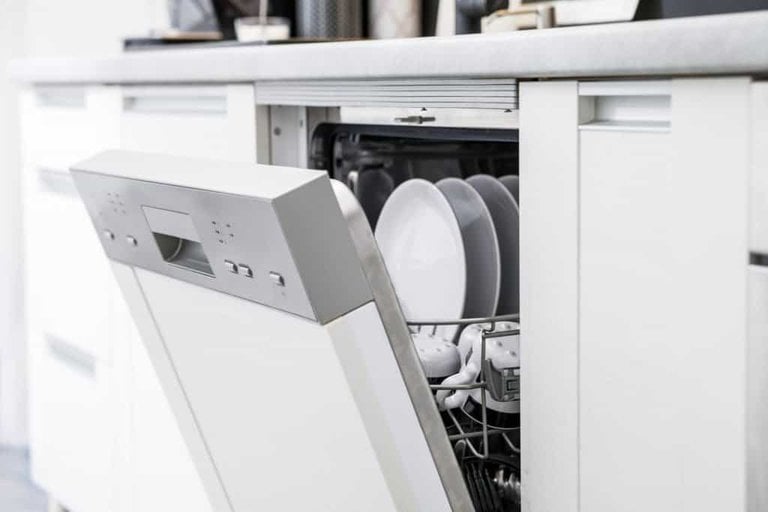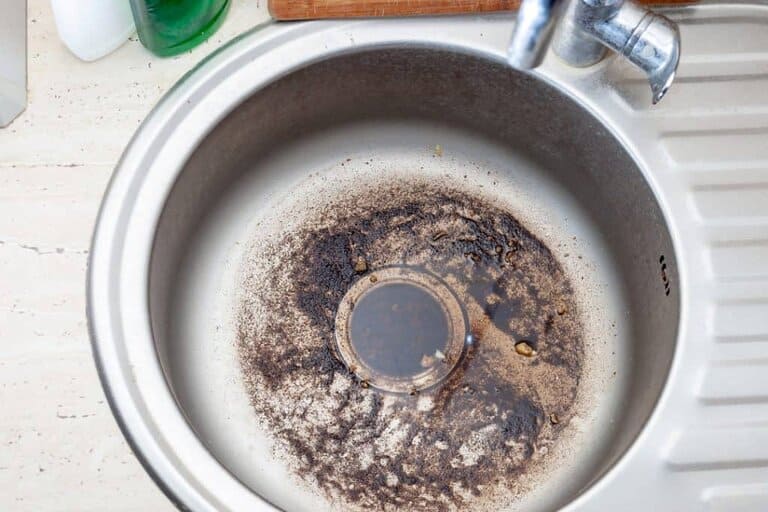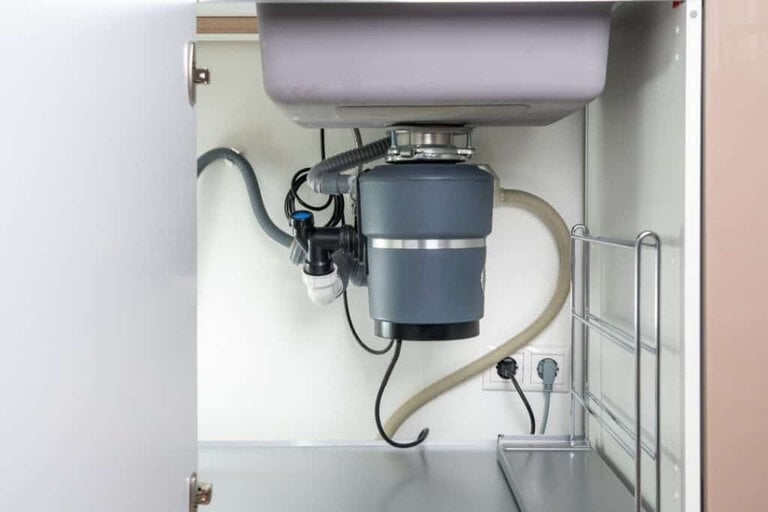You can run a dishwasher and garbage disposal simultaneously if the plumbing is appropriate and the appliances do not share a circuit.
It is a cold winter night, and you made a hearty stew for dinner. When you are done with the cooking, you load the pots and pans in the dishwasher and put the peels in the garbage disposal. Ah! The kitchen will be clean in a minute, and you will enjoy your cozy meal with the family.
But alas! The dishwasher and garbage disposal both come to an abrupt stop as their breaker trips, and you are left with undone dishes and half-mashed food waste. What a nuisance!
If instances like these make you wonder whether you can run the two appliances together, this article has all the answers. We will cover in detail whether using them at the same time is good or bad and elaborate on the reasons too. So keep reading!

Garbage Disposal And Dishwasher: How They Are Related?
Garbage disposals are handy appliances fitted underneath your kitchen sink that run on electricity to grind food waste for you. They help keep your drain pipes unclogged by turning large chunks of debris into smaller bits.
On the other hand, dishwashers lie close to the disposal and have an entirely different purpose. Just as the name implies, they scrub and wash your dirty dishes.
How the two of them are connected, you might ask.
Both these appliances share the same drain pipe. Although there is an air gap or anti-siphon between their drains to keep them from mixing, the system can still mess up and cause an abruption in their functions.
When Can You Run Garbage Disposal And Dishwasher Together?
Generally, it is SAFE to run your garbage disposal and dishwasher simultaneously. It requires perfect plumbing and suitable electrical connections, which usually is the case, by the way.
So if you want to use them together, there is usually no harm in it. Just remember to leave the garbage disposal running for a little while before turning on your dishwasher, so there is no obstruction in the former when the latter drains.
When Can You NOT Run Garbage Disposal And Dishwasher Together?
There are a few exceptions where you should not use these two appliances together. Two such scenarios are:
Imperfect Plumbing
Garbage disposals and dishwashers usually drain into a single pipe. If the plumbing here is not in a perfectly reasonable condition, you may have to face some severely yucky situations.
According to the default setting, the dishwasher drains into the garbage disposal’s drain pipe. There is an air gap or anti-siphon between the two connections that prevent the water re-entry from the garbage disposal to the dishwasher.
A malfunctioning air gap will understandably cause a very sickening situation. The food wastes from the disposal will enter the dishwasher and ruin your dishes. It can happen when you run both of these devices simultaneously and when the disposal is crushing a hard object like a pit or a bone.
There will be a lot of splash and splatter due to the vigorous grinding that can lead to the reverse flow of the water.
Hence, if you are unsure of your plumbing, always reconsider using the two together before having a plumber check your drainage system.

Shared Circuit
It is often recommended to install these two devices with separate circuits. Sharing a single circuit between them can cause trouble if you use them concurrently.
It is an electrical rule never to let the total load on a circuit surpass 80% of 20 Amperes. Overloading will trip the circuit breaker or cause short circuits too.
A garbage disposal uses 4 to 8 amperes, whereas a dishwasher can utilize 10 to 11 amperes. When we add the two, the sum will quite easily be greater than the 80% of 20 amperes. Hence you can expect your breaker to trip repeatedly if you are using them simultaneously.
Also, most housing codes obligate you to follow the 20-ampere upper limit for all circuits. You should hire a professional electrician to do your kitchen’s wiring, so there are no problems in the future.
The kind of electrical connection you use can also cause a considerable difference. According to the housing rules, a cord and plug connector are generally unsafe and illegal. You will need to hardwire both of the fixtures.
Other Common Mistakes While Using A Garbage Disposal
Some more mistakes that many people make while using garbage disposal are:
Using Hot Water While Grinding
Many people believe that hot water can assist the grinding process when in reality, it only melts down fats and makes them more prone to sticking to the insides of the appliance. Always run cold or tap water when the machine is running.
Pouring Oil Down The Drain
Oil or fats from foods will damage your disposal considerably since they can stick to the walls and cause clogging. Never pour oil, grease, or fats down the drain.
Not Cleaning The Disposal
Clean garbage disposal will work efficiently, while a dirty one will be clogged often. Proper maintenance and thorough cleaning of the appliance will ensure its correct operation and long life.
Using Harsh Bleach And Drain Cleaners
Concentrated bleaches and harsh cleaners can damage the blades or plastic parts of the machinery. Always look for cleaning products suitable for your garbage disposal, such as Sani sticks, green goblin, etc.
Alternatively, you can use natural remedies like orange peels, ice, baking soda, and vinegar.
Using Insufficient Water
Running ample water before and after grinding waste in the garbage disposal is necessary to prevent clogs. Run abundant cold water before you run the appliance and after you have shoved all food down, run water for another 20 to 30 seconds.

Other Common Mistakes While Using Dishwasher
In addition to using it with garbage disposal without proper plumbing and circuitry, here are a few more common mistakes you should avoid while using a dishwasher:
Pre-Rinsing The Dishes
Most of us think rinsing the dishes before loading them in the dishwasher will help with their cleaning. But the fact is far from it. Pre-rinsing adds to your water consumption and misleads the appliance into thinking that your dishes are clean and don’t need scrubbing. Hence, you might end up with dirtier dishes.
Improper Loading
Not loading your utensils correctly, in their assigned spaces and in proper positions will result in ineffective cleaning. Stack flat plates and cutlery in their respective baskets. Ensure that the spoons and knives are facing down while the forks are propped up.
Overloading
Another common mistake many people make is overloading their washers. Cramming up as many utensils as possible may be tempting, but it can take up more of your time than saving it. You might end up redoing your dishes or picking food scraps off the cutlery.
Not Drying Out Between Washes
The dishwasher has a constantly wet environment that may be hazardous for its rubber parts and hygiene. Leave the door slightly ajar to let the interiors dry up between washes. It helps keep the appliance in shape for a long time and prevents mold and mildew build-up.
Not Cleaning The Dishwasher
Just like your dishes, your dishwasher needs regular washing too. Imagine filters clogged by rotting food scraps. Gross! Clean your dishwasher every day and deep-clean at least once a week. It should include removing and washing the filters to keep the gunk out, and the dishwasher unclogged.
Loading Non-Dishwasher Safe Utensils
Due to heat, wooden spoons and fancy stem glasses will crack in the dishwasher. Always check if the utensils you are loading are dishwasher-friendly or not.

FAQs Regarding Running Garbage Disposal While The Dishwasher Is Running
Can I run my dishwasher if my garbage disposal is not working correctly?
A dishwasher runs independently of the garbage disposal. Hence you can run the washer even if the disposal is broken, off, or non-existent.
Will a dishwasher drain even if the garbage disposal is clogged?
Yes. The dishwasher usually drains through its outlet regardless of the garbage disposal. Improper plumbing is an exception where the drain pipes of both appliances are connected through an elbow joint or when the dishwasher’s outlet opens in the disposal.
How to fix garbage disposal draining into the dishwasher?
When the drainpipe of the garbage disposal has a plug lower than where it joins the dishwasher’s outlet, the garbage from the disposal can end up in the washer. In such a case, clear the clogging and elevate the dishwasher’s hose higher than the disposal’s.